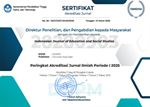Abeysekera, L., & Dawson, P. (2015). Motivation and cognitive load in the flipped classroom: Definition, rationale, and a call for research. Higher Education Research & Development, 34(1), 1–14. https://doi.org/10.1080/07294360.2015.1014133
Andiansyah, E. H. (2020). Develop positive attitudes and student understanding through contextual learning with demonstration methods or field trips. Journal of Education, 9(1), 81–89.
Becker, B. W. (2013). Start flipping out with guide on the side. Behavioral & Social Sciences Librarian, 32(4), 257–260. https://doi.org/10.1080/01639269.2013.838879
Dizbay, A. K., & Alacapınar, F. G. (2024). The effect of flipped learning model in distance education on student achievement and student views about the model. International Journal of Quality in Education.
Dudko, O. G., & Glubochko, O. V. (2025). Flipped classroom for learning of traumatology and orthopedics during the war period in Ukraine. Pedagogical Academy Journal.
Fauziya, M. (2025). Email and Letter Writing: Practical and Functional Skills for Real-Life Communication in The EFL Classroom. American Journal of Philological Sciences, 5(05), 189-191. https://doi.org/10.37547/ajps/Volume05Issue05-50
Hasumi, Y., & Chiu, Y. H. (2024). Digital resources and flipped instruction: Enhancing learner engagement and autonomy in business English courses. Journal of Language and Digital Learning, 15(2), 133–148. https://doi.org/10.1080/2326768X.2024.1853312
Heredia-Arboleda, E. E., Figueroa, M. N. C., Moreno, M. I. U., & Cevallos, A. A. C. (2024). The Flipped Classroom to Improve the EFL Listening Skill. Theory and Practice in Language Studies, 14(7), 1960-1970. https://doi.org/10.17507/tpls.1407.02
Huang, R. H., Liu, D. J., Tlili, A., et al. (2020). Handbook on facilitating flexible learning during educational disruption. Smart Learning Institute of Beijing Normal University.
İbili, E., Ölmez, M., İbili, A. B., & Bilal, F. (2024). Student perceptions of synchronous online flipped learning supported by a metaverse-based platform in medical English education: A mixed-methods study. Education and Information Technologies. https://doi.org/10.1007/s10639-024-11109-4
Khodabandeh, F. (2025). Investigating the effectiveness of augmented reality-enhanced instruction on EFL learners’ speaking in online flipped and face-to-face classes. Language Teaching Research, 29(5), 2225-2244. https://doi.org/10.1177/13621688221110991
Lee, K., & Wallace, A. (2018). Flipped learning: A review of the literature. Journal of Educational Technology Development and Exchange, 11(1), 1–10. https://doi.org/10.18785/jetde.1101.01
Lo, C. K. (2017). A critical review of flipped classroom challenges in K-12 education: Possible solutions and recommendations for future research. University of Hong Kong. https://doi.org/10.1186/s41039-016-0044-2
Mas'ud, H., & Surjono, H. D. (2018). The implementation of flipped classroom learning model using Moodle to increase students’ higher order thinking skills. Journal of Educational Science and Technology, 4(3), 187–194. https://doi.org/10.1007/s43052-020-00027-1
Melnyk, A. (2024). Integrating blended learning in pre-service English teacher education: Enhancing professional speech communicative competence. Distance Education in Ukraine: Innovative, Normative, and Practical Aspects. https://doi.org/10.18372/2786-5495.1.18878
Melnyk, Y. (2024). Blended flipped learning: Empowering future English teachers’ professional communication. International Journal of Language and Learning, 14(1), 45–58. https://doi.org/10.1007/s43052-024-00014-4
Morales, M. (2024). The effect of the flipped classroom on English language learning: A meta-analysis across 13 countries. ELT Journal, 78(2), 125–140. https://doi.org/10.1093/elt/ccz046
Mundiri, A., Munawwaroh, I., Hadi, M. I., Baharun, H., Shudiq, W. J. F., & Maulidy, A. (2025). Artificial Intelligence (AI) Innovation in Education: From Data-Driven Learning to Automated Teaching. Proceedings of the 2025 IEEE International Conference on Industry 4.0, Artificial Intelligence, and Communications Technology, IAICT 2025, 173–180. https://doi.org/10.1109/IAICT65714.2025.11100623
Naningsih, E., Hidayah, F., Aniati, A., & ... (2024). Enhancing Learning Quality: The Role Of Teacher Competence In Madrasah. Jurnal At-Tarbiyat …, 7(3).
Pambayu, R. A. I., Asiyah, S., & Indriastuti, N. R. (2024). The Effectiveness of Flipped Classroom Model Towards Students Listening Comprehension in The Tenth Grade of SMAN 1 Badegan. Pedagogic Research-Applied Literacy Journal, 1(3), 125-131. https://doi.org/10.70574/nf441t27
Roshid, M. M., & Kankaanranta, A. (2025). English communication skills in international business: Industry expectations versus university preparation. Business and Professional Communication Quarterly, 88(1), 100-125. https://doi.org/10.1177/23294906231184814
Rozi, F., & Badriyah, N. (2025). Elementary Madrasah Teachers’ Perceptions of the Seamless Learning Model. JETech: Journal of Education and Technology, 1(1), 1–9.
Ruttanasirivilailert, S., Poomarin, W., & Meeprom, B. (2025). Readiness of Thai Banking Employees for English Email Correspondence in International Trade Finance: Opportunities and Challenges. Journal of Liberal Arts RMUTT, 6(1), 14-29. https://doi.org/10.60101/jla.2025.6.1.6593
Seed, H. (2024). Reflection, engagement, and the flipped classroom: Lessons from teacher training programs. Journal of Innovative Teaching Methods, 11(3), 98–112. https://doi.org/10.1186/s40797-024-00122-z
Solotova, N., Romanova, O., & Antoshina, E. (2024). The effectiveness of using digital technologies in learning English as a second language. eLibrary.ru.
Temiz, H. (2024). Preparing teachers for the 21st century with flipped learning. Journal of Educational Research and Innovation, 9(1), 45–60. https://doi.org/10.1108/JERI-04-2024-0017
Thiagarajan, S., Semmel, D. S., & Semmel, M. I. (1974). Instructional development for training teachers of exceptional children: A sourcebook. Indiana University.
Utamimah, S., & Nur Aisyah, E. (2025). Implementing Project-Based Learning with Loose Parts in Early Childhood Education: A Qualitative Descriptive Study. Golden Age: Jurnal Ilmiah Tumbuh Kembang Anak Usia Dini, 10(1), 71–84. https://doi.org/10.14421/jga.2025.101-06
Vygotsky, L. S. (1978). Mind in society: The development of higher psychological processes. Harvard University Press.
Zhang, L., & Lee, C. (2022). Challenges and opportunities in implementing flipped learning in higher education. International Journal of Instructional Design, 18(4), 90–105. https://doi.org/10.1186/s40462-022-00015-1
 (Universitas Negeri Jakarta)
(Universitas Negeri Jakarta) 



